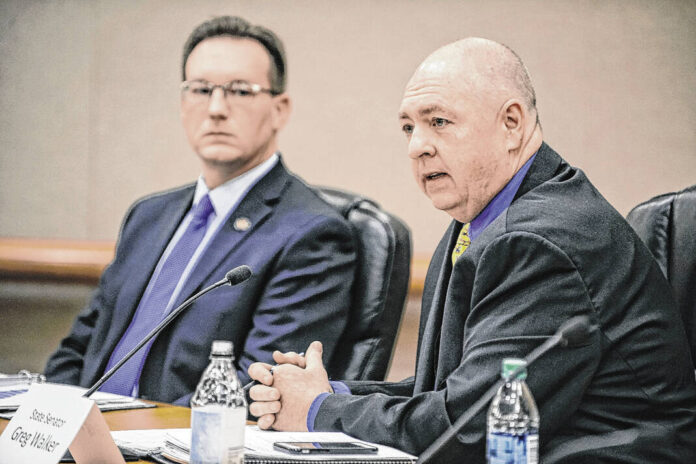
Mike Wolanin | The Republic State Sen. Greg Walker addresses issues related to legislation concerning teacher’s pay and public education during a Third House session with state legislators in the council chambers at Columbus City Hall in Columbus, Ind., Monday, March 25, 2019.
An Indiana Senate committee that includes Sen. Greg Walker, R-Columbus, has endorsed a proposal that would toughen the identification requirements to vote absentee by mail, paving the way for the full Senate to consider the measure this session.
The bill, HB 1334, would require voters who request a paper application for an absentee-by-mail ballot to provide the last four digits of the Social Security number, or their 10-digit driver’s license number, state ID number or voter ID number. Alternatively, applicants could instead submit a photocopy of any ID that meets state voter ID requirements.
The current absentee-by-mail application form asks for the last four digits of the voter’s Social Security number but states that it is optional for voters to provide that information. Local election officials said they validate the applications by verifying that the name, date of birth, address and signature match their voting registration record.
If voters provide the last four digits of their Social Security number, local election officials said that they also will verify that it matches voter registration records.
A version of the bill previously cleared the House in a 64-28 vote last month.
Partisan divide
Support for the proposal has been largely divided along party lines.
Republicans, including the bill’s author, Rep. Timothy Wesco, R-Osceola, have said that the bills seek to put identification requirements for absentee-by-mail ballots in line with what people must present when voting in person.
“I’ve long felt that the process of simply matching signatures as the means of verifying the authenticity of an absentee ballot application is insufficient and extremely subjective,” Wesco said during a hearing last week.
Democrats, for their part, have said the bill would add “unnecessary barriers” to voting by mail and be particularly difficult for some voters who are elderly, disabled or living in rural areas.
“Indiana already has a secure and reliable voting system, with numerous safeguards in place to prevent fraud and ensure the accuracy of election results,” the Indiana Democratic Party said in a statement earlier this month. “The proposed bill is a solution in search of a problem.”
Amid the controversy, the Senate elections committee advanced the bill to the full Senate in a party-line vote last week. Walker, who is ranking member of the committee, voted in favor of advancing the bill.
Walker, however, declined to discuss his views on the bill, telling The Republic through a press secretary that “the bill is a work in progress” and that “he is not available to discuss at this point.”
Earlier this month, Walker suggested during a committee hearing that he was at least supportive of the bill’s intent.
“I read the bill. I think I understand what your bill is trying to accomplish,” Walker told Wesco, during a Senate election committee hearing on March 6. “I think it’s a good effort to sort of unify the practices in how we apply for the absentee ballot.”
Rep. Ryan Lauer, R-Columbus, voted in favor of the bill in February when it came before the House. The bill passed the House in a 64-28 vote.
Lauer told The Republic that he voted for the bill because he believes it “does a lot to ensure election integrity” in Indiana.
“Currently, voting by mail does not require a photo ID, and so this bill addresses that concern for election-integrity purposes,” Lauer said. “…I think this bill does a lot to ensure election integrity in our elections to make that our absentee ballots, our mail ballots, have a proper identification to make sure that the person (applying) is a legal voter.”
Wave of legislation
The bill being considered in Indiana comes amid a wave of Republican-backed legislation across the country that seeks to enact new limits on a process that exploded in popularity during the COVID-19 pandemic, including in Bartholomew County.
The trend began during the 2021 legislative session following false claims by former President Donald Trump and his allies of widespread fraud in 2020 presidential election, including the false claim that mail voting “is a vehicle for widespread voter fraud,” according to the Brennan Center for Justice, a nonpartisan law and policy institute at New York University.
At least 80 bills in 23 states would restrict mail voting to varying extents have been filed in state legislatures across the country this year, including Indiana, as of last month, according to the institute.
The proposals would enact new limits on who is eligible to vote by mail, set new identification requirements for requesting and returning mail ballots, shorten periods for applying for or returning mail ballots, eliminate permanent absentee voter lists and eliminate or limit the use of drop boxes, the institute states.
A total of 6,549 local voters cast absentee-by-mail ballots in the 2020 general election locally— nearly 18% of all votes. By comparison, 1,536 voters in the county voted absentee-by-mail in the 2016 general election, or about 5% of all ballots cast.
There also was an increase in absentee-by-mail voting in the 2022 midterm compared to the 2018 midterm even as overall turnout declined. A total of 1,783 absentee-by-mail ballots were cast in Bartholomew County in last year’s general election, up from 1,547 during the 2018 general election.
Bartholomew County Clerk Shari Lentz said her office rarely finds any discrepancies between absentee-by-mail ballot applications and voter registration records. In addition, Lentz said there have been no cases of voter fraud in the county since she has been clerk or working at the clerk’s office.
Former Bartholomew County Clerk Jay Phelps said in 2020 that he couldn’t recall the last time there was a case of voter fraud in Bartholomew County, but suspected it has been at least two decades and “probably a little farther back than that.”
Also in 2020, former Bartholomew County Prosecutor Bill Nash, who at the time had been serving as prosecutor for about 17 years, that he couldn’t recall any reports of voter fraud in the county being referred to his office,
Lentz, who is on Indiana Clerks Association’s Legislative Committee, said that she is supportive of “any practices that will make sure that we are protecting the voters’ vote.”
“If (HB 1334) helps in making that happen, I’m all for that,” Lentz said.
No excuses?
Last week, the Republican-led Senate elections committee also rejected a proposed amendment to HB 1334 that would have allowed voters to cast a no-excuse absentee ballot by mail.
Currently, voters in Indiana must select under penalty of perjury one of several approved reasons to be eligible to vote absentee by mail, including being out of town on election day, being 65 or older, being confined to their residence or a hospital due to illness or injury, among others.
The proposed amendment would have gotten rid of that requirement.
Walker was the only Republican on the Senate elections committee who voted in favor of getting rid of the excuses for voting absentee by mail.
“I’ve been a champion of this for years,” Walker said during the committee hearing, referring to getting rid of the excuses. “…No one is enforcing this language or following up to see whether I stayed with my indigent or infirmed mother or not throughout the course of the day.”
Lauer said he would be against removing the excuses, stating that voters already have enough opportunities to vote early, absentee by mail or on election day.
“We have 28 days for early voting. A large number of Hoosiers are eligible to have mail voting, and I think the system we have is accessible to anybody who is eligible and wants to vote. I think there is every opportunity for voters to do that,” Lauer said.
Lentz said the absentee-by-mail application is essentially a signed affidavit in which voters are attesting that their excuse is true and accurate.
However, Lentz said that “it would be physically impossible for us to see if someone was actually out of the county that day or the different scenarios that might apply.”
As of Friday afternoon, HB 1334 was still pending in the Senate.




